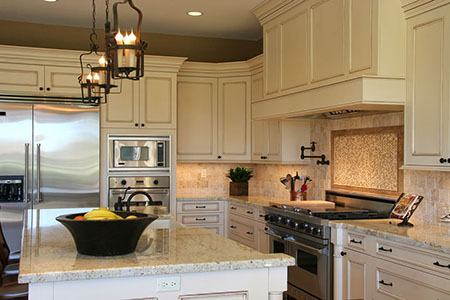Kitchen Countertops: Why Quartz Beats Granite Every Time
 For many years, granite was king when it came to kitchen countertops. People loved the idea of bringing a natural element into their homes. Available in a variety of colours and patterns, granite looked great in many different kinds of kitchens—from modern, minimalist styles to more traditional designs. Although granite looks beautiful, it has many drawbacks. Due to these negatives, many designers and homeowners have started choosing countertops made of quartz. Here are a few of the factors that play into this decision.
For many years, granite was king when it came to kitchen countertops. People loved the idea of bringing a natural element into their homes. Available in a variety of colours and patterns, granite looked great in many different kinds of kitchens—from modern, minimalist styles to more traditional designs. Although granite looks beautiful, it has many drawbacks. Due to these negatives, many designers and homeowners have started choosing countertops made of quartz. Here are a few of the factors that play into this decision.
Price
One of the first drawbacks to granite is price. While lower-quality granite is a bit lower priced than quartz, the more sought-after, high-end granite is much more expensive. For those who prefer a more natural look, quartz is available in styles that resemble high-quality granite at a fraction of the cost.
Style
Another reason to choose quartz is the sheer variety of styles that are available. Natural stones like granite are limited in variety, while man-made materials like quartz can be produced in an infinite amount of colours, textures, and patterns. If your goal is a contemporary kitchen with countertops that look stylish and modern, you’ll be able to find the perfect quartz for your design. The same holds true if you’re creating a more traditional style of kitchen. From thick, squared-off edges to bullnose or intricate, layered designs, quartz countertops are incredibly versatile.
Durability and Maintenance
One of the biggest reasons to choose quartz over granite is ease of use. As homeowners installed granite and began to go about their daily lives, they soon discovered that although natural stone is tough, it has many weaknesses. Unlike quartz, granite can be prone to scratching and chipping—not good when used in an environment where you’re working with heavy cookware and sharp utensils. Another huge drawback to granite is the maintenance required to keep it looking new. Whether it’s being used in the kitchen or bathroom, granite must be thoroughly sealed in order to protect it from staining by dark-coloured substances like wine, as well as oils. As time passes and granite countertops are subjected to use, they’ll need to be resealed every year or so as the sealant wears down. Spill wine or splatter cooking oil in an area that’s not well-sealed and you’ll be rewarded with a nasty stain. None of this is a concern with quartz. It never needs to be sealed and is built to be stain-resistant. Whether you’re peeling red beets or knock over a glass of red wine, you won’t have to worry about unnoticed splashes of staining substances leaving blemishes on your quartz countertops. Another reason quartz is so great? Anyone who has ever spilled something acidic like vinegar on a granite countertop and not noticed it until it left a permanent shadow in the shiny coating knows what a threat etching can be to natural stone. Unlike granite, quartz is resistant to etching. Natural stone suppliers often suggest using special cleaning agents for many of their products. Not so with quartz! Simply use a bit of dish soap and warm water. If you have a favourite, scented cleaner, make sure it’s a gentle one and spritz away. Quartz’s only enemies are harsh/abrasive cleaners and heat. Never use anything such as steel wool or harsh chemicals to clean it and protect it from hot pans with a pad or trivet. Follow these rules and your quartz will look gorgeous for a very long time.
From price to the wide variety of styles that are available, shopping for your new quartz countertops will be a pleasure. Once you have them installed, you’ll agree that when it comes to strength and stress-free maintenance, quartz simply can’t be beat.
- What to Consider when Buying Quartz Countertops
- Maintenance Tips for Quartz Countertops
- Is Quartz a Safe Material for Countertops?
- How To Get The Best Price On Quartz Countertops
- Estimating the Cost of Quartz Countertops
- Choosing Quartz Countertop Color
- Blue Quartz Countertops: What You Need To Know
- All You Need To Know About Quartz Tile Countertop
- Advantages of Installing Countertops Made Of Quartz
- How to Choose a Quartz Countertop
- Why Quartz Kitchen Countertops Are the New Trend
- Care and Cleaning of Your Quartz Countertops
- Are Quartz Countertops Right for Your Kitchen?
- 3 Reasons Why Quartz Kitchen Countertops Are Simply Better
- Why the Best Kitchen Countertops Are Made of Quartz
- Kitchen Countertops: Why Quartz Beats Granite Every Time
- Granite vs Quartz Countertops: Which Material is Best?
- Easy and Beautiful: Care and Maintenance of Your New Quartz Countertops

